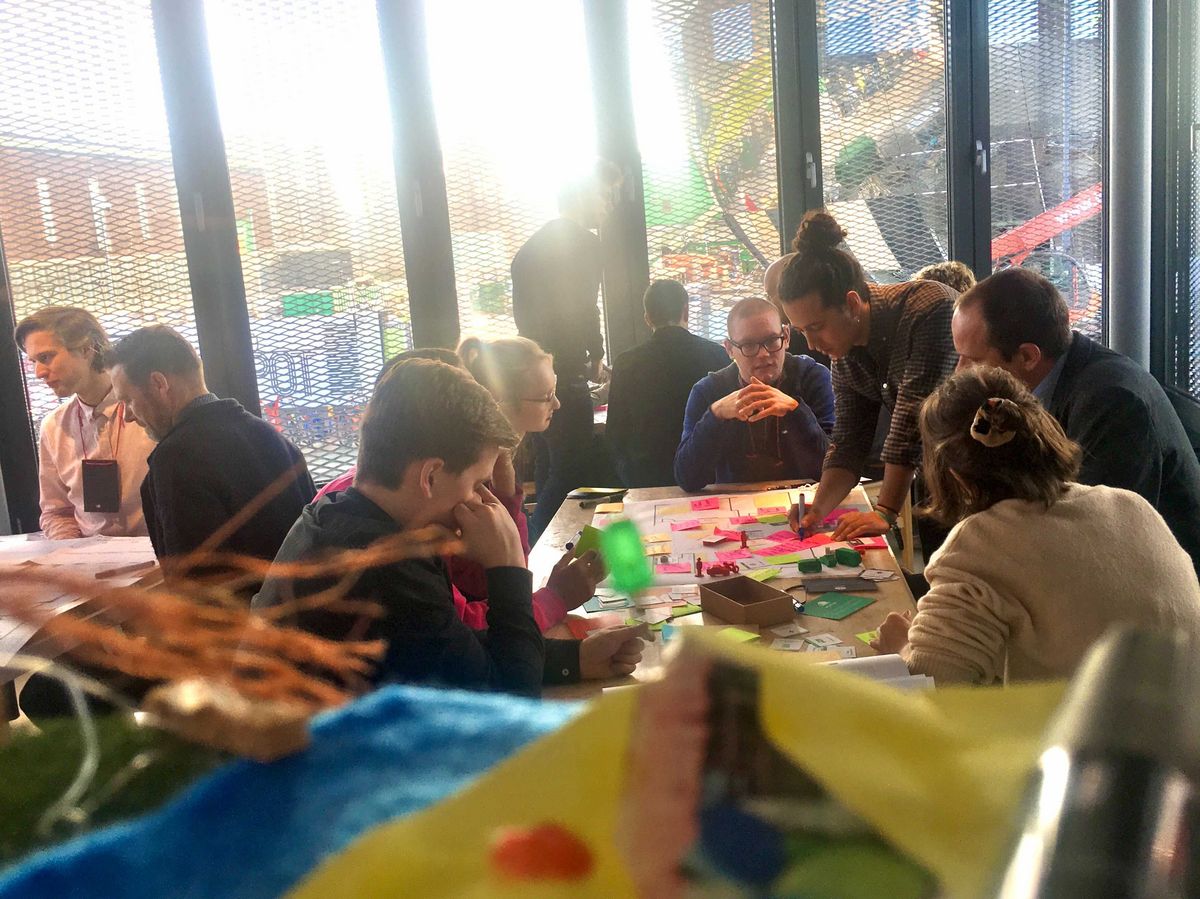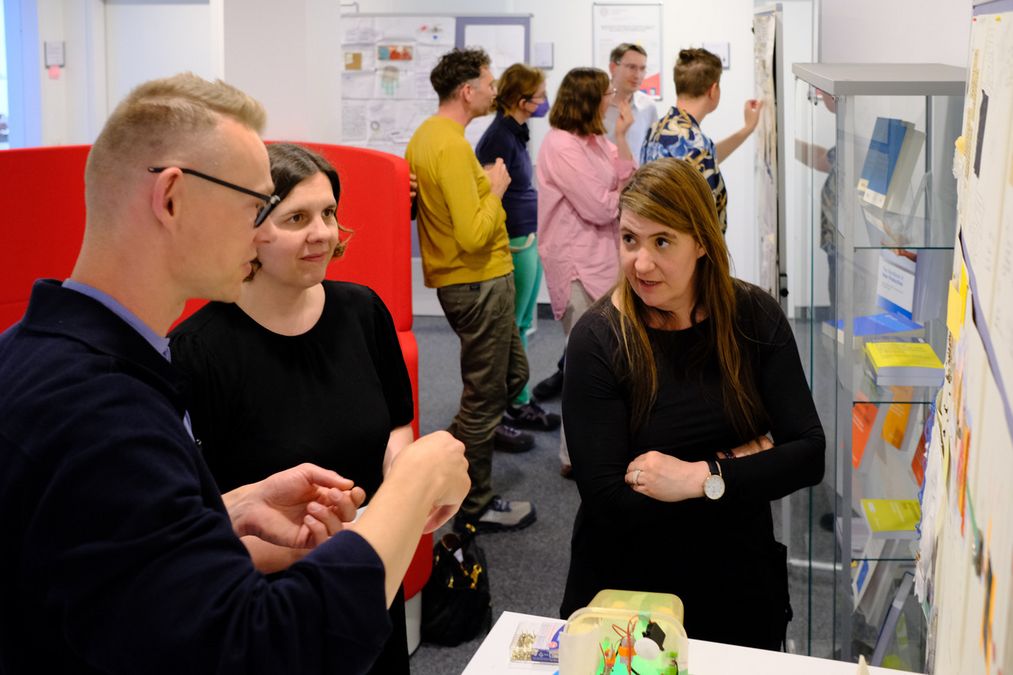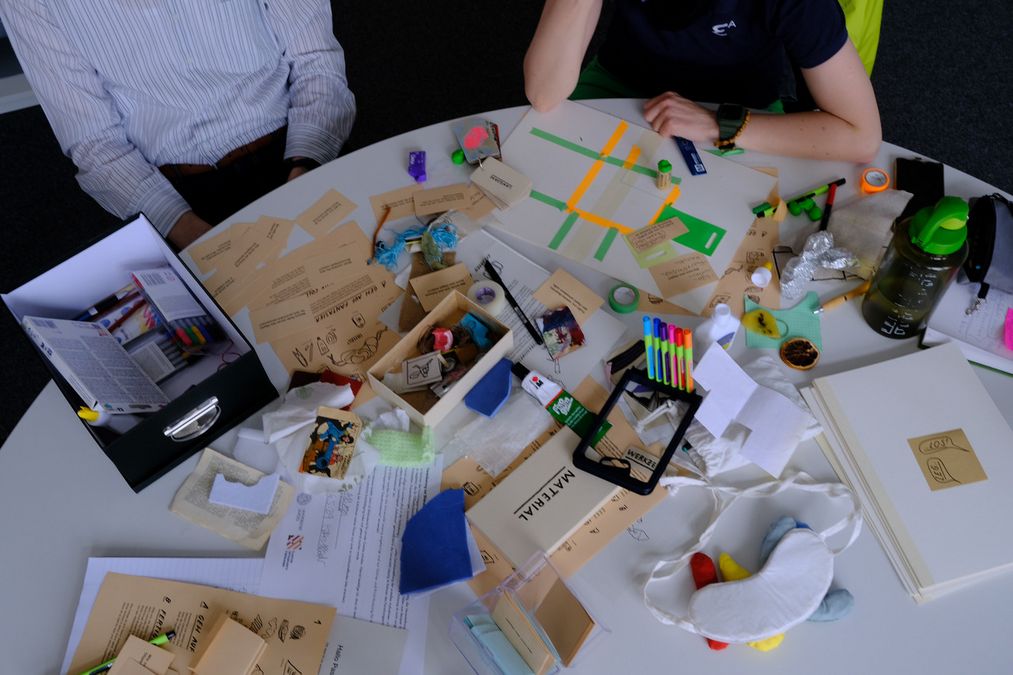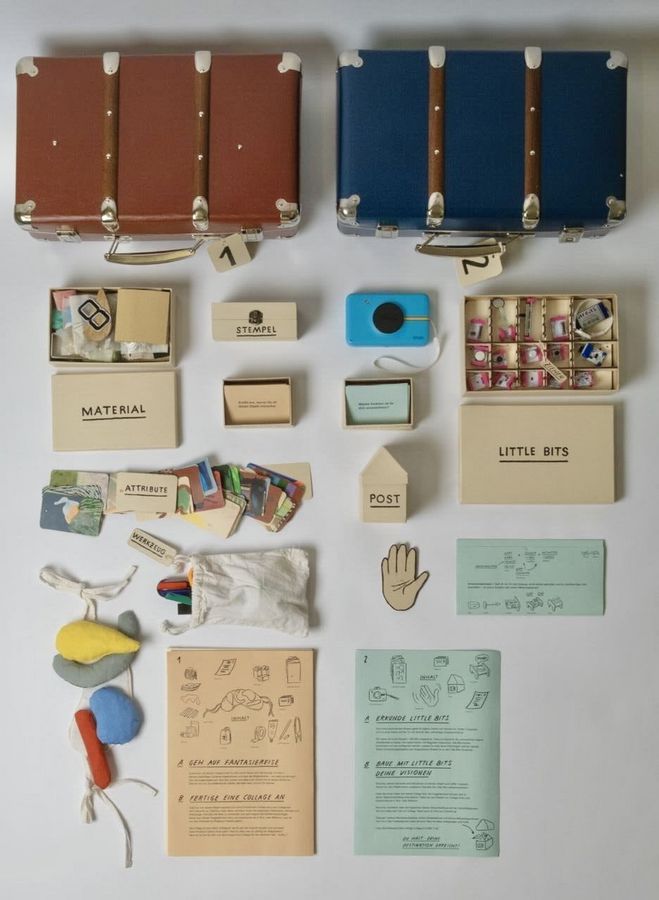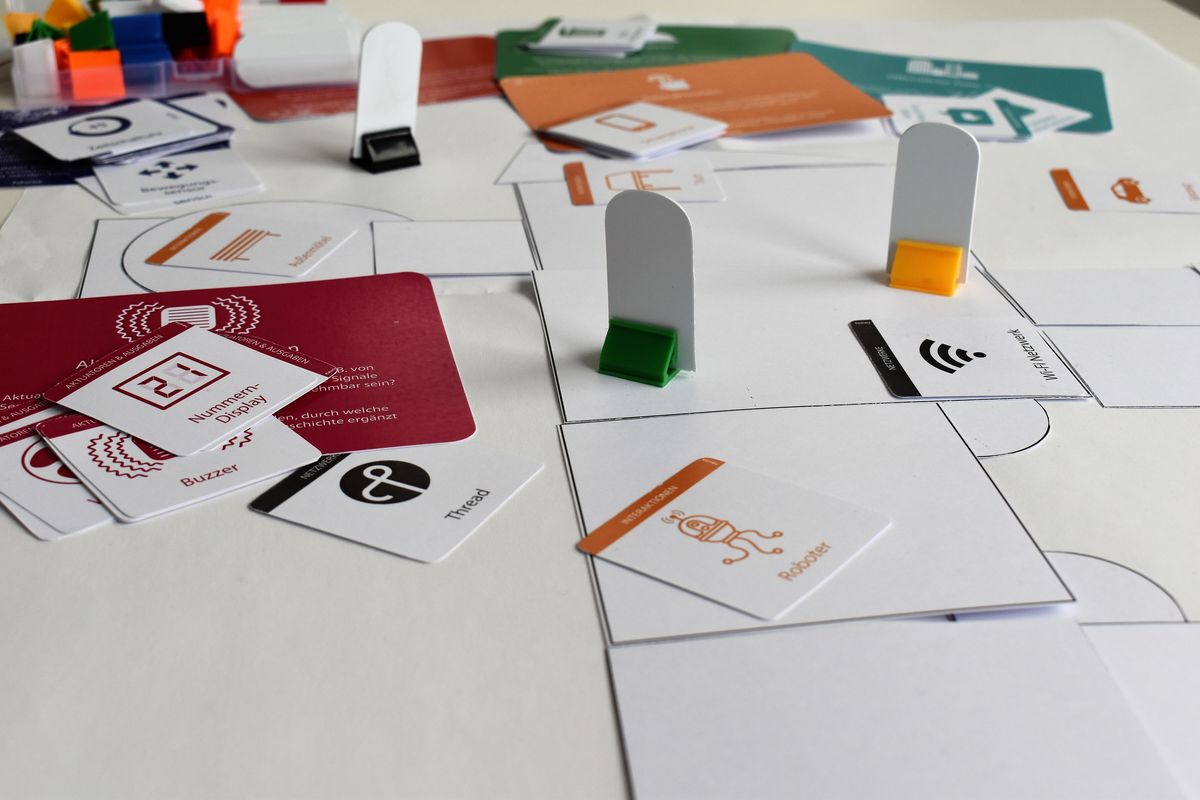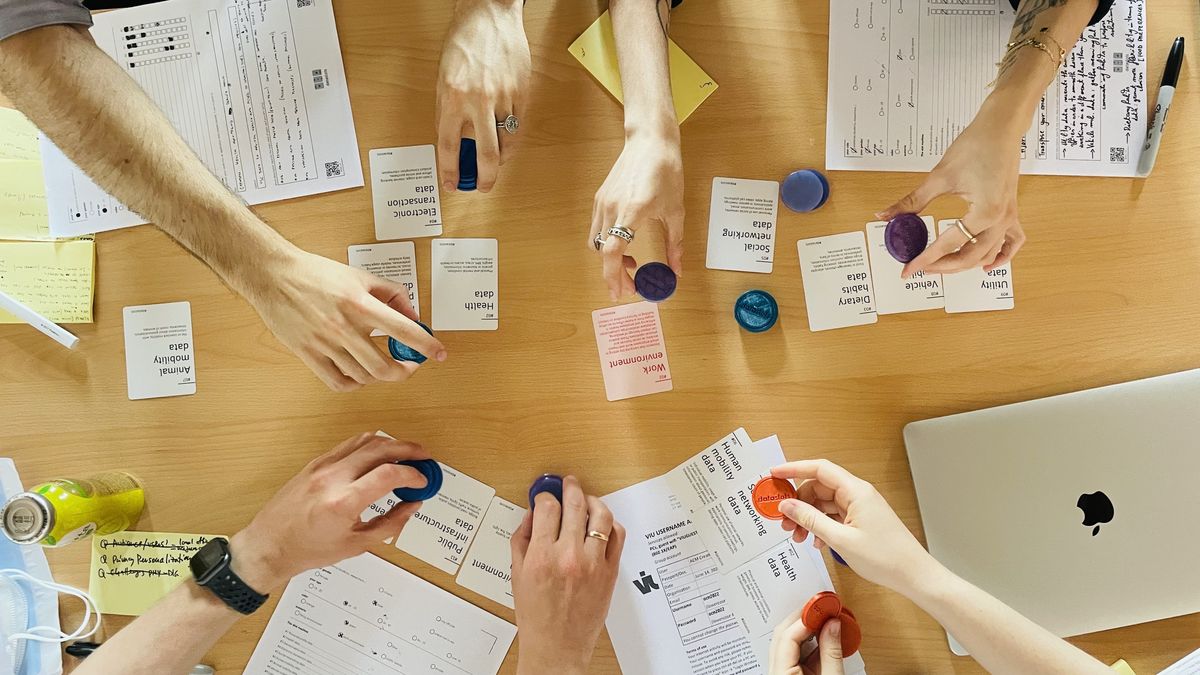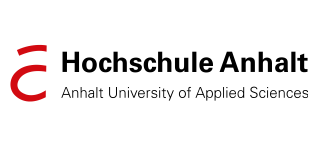Im Projekt futurehomestories entwarfen Teilnehmende auf Grundlage ihrer persönlichen Lebenserfahrungen, Wünsche und Bedürfnisse zusammen mit Forschenden individuelle, alternative und innovative Szenarien für das Zuhause der Zukunft.
Wie können Menschen durch Co-Creation Methoden Geschichten darüber erzählen, wie sie in Zukunft mit Technologien in ihrem Zuhause leben möchten?
Um diese Frage beantworten zu können, haben wir Menschen aus der Bevölkerung zu Co-Creation Workshops eingeladen, damit sie ihre Ideen, wie sie im so genannten smart home leben wollen, aktiv einbringen können. Ihre aktive Teilnahme ermöglichte es uns, das Zuhause als Anwendungsort für neue Technologien besser zu verstehen. Für die Workshops wurde ein Koffer konzipiert, der auf bereits vorhandenen Methoden und Werkzeugen aufbaut. Dieser wurde auf Reisen zu Teilnehmenden geschickt oder in Workshops verwendet. Das im Koffer enthaltene Material gab den Partizipierenden die Möglichkeit, ihre persönlichen Ideen auszudrücken.
Die resultierenden Ergebnisse etwa in Form von Geschichten wurden dokumentiert und in Form eines Buchs der alternativen Zukünfte (Zine) an die Bevölkerung zurückgegeben und dem Fachpublikum zugänglich gemacht.
Für das Ziel von futurehomestories, die erprobten Co-Creation Methoden nachhaltig zur Verfügung zu stellen, wurden die im Koffer enthaltenen Methoden und Werkzeuge durch die Forschenden verglichen und analysiert sowie für eine kontextunabhängige Benutzung aufbereitet.
Das Projekt futurehomestories war Teil des Netzwerks für integrierte Forschung. Dieses verfolgt in seiner Fortführung weiterhin als übergeordnetes Ziel die Konzeption, Umsetzung und Etablierung integrierter Forschung, wobei darauf hingearbeitet wird, dabei zu einem umfassenden Forschungskonzept für integrierte Forschung zu gelangen.
Futurehomestories setzte sich dabei kritisch mit verschiedenen Aspekten integrierter Forschung auseinander und strebte eine transdisziplinäre Adaption, Durchführung, Reflexion sowie den Transfer von Co-Creation Methodiken an. Dafür galt es, ethische, rechtliche und soziale Aspekte in den Co-Creation-Prozess und dessen Reflexion zu etablieren. Insgesamt wurde so das Ziel verfolgt, integrierte Forschung weiter voranzutreiben.
Das Projekt gliederte sich in vier aufeinanderfolgende Phasen und zwei Arbeitsbereiche, die sich über die ganze Dauer des Projekts erstreckten.
Phase 1: Vorbereitung des Projekts.
Phase 2: Konzeption und Durchführung der Co-Design Workshops.
Phase 3: Überarbeitung des Konzepts und erneute Durchführung von Workshops.
Phase 4: Nachbereitung der Erkenntnisse aus den vorherigen Phasen und Wissenstransfer in Wissenschaft und Gesellschaft.
Prozessbegleitende Phasen
Über die gesamte Dauer des Projekts wurde die Kommunikation und Kooperation zwischen Forschenden unterschiedlicher Fachdisziplinen sichergestellt. Ferner fand ein kontinuierlicher Austausch mit der Öffentlichkeit und dem Fachpublikum statt.
Laufzeit
01. April 2021 bis 30. Juni 2024
Schulte, B., Becker, A., Haupt, B., Berger, A., & Pentzold, C. (2024). futurehomestories: Integrierte Forschung als Co-Creation Praxis. Abschlussbericht zum Projekt futurehomestories. Hochschule Anhalt, Köthen. http://dx.doi.org/10.25673/116480
Bischof, A., Köpferl, K., Haupt, B., Becker, A., Pentzold, C., & Berger, A., (2024). Partizipative Wissenschaftskommunikation für (zukünftige) Technologien. In S. Kernebeck & F. Fischer (Hrsg.) Partizipative Technikentwicklung im Sozial- und Gesundheitswesen: Interdisziplinäre Konzepte und Methoden (1. Auflage, S. 161-174). Hogrefe Verlag, Bern. Mehr
Haupt, B., Pentzold,C., Becker, A. & Berger, A. (2023). Designing alternative future home stories. INFORMATIK 2023 - Designing Futures: Zukünfte gestalten. DOI: 10.18420/inf2023_99. Bonn: Gesellschaft für Informatik e.V.. PISSN: 1617-5468. ISBN: 978-3-88579-731-9. pp. 893-898. Kultur & Design - Designing alternative future home stories. Berlin. 26.-29. September 2023. https://doi.org/10.18420/inf2023_99
Becker, A., Haupt, B., Berger, A. & Pentzold, C. (2022). Future home stories: participatory predicaments and methodological scaffolding in narrative speculation on alternative domestic lives. Digital Creativity, 33(3), 276–294. https://doi.org/10.1080/14626268.2022.2082488
Offene Werkstatt – Zur Analyse multimaterieller Collagen der Cultural Probe Adaption ‘Little Boxes’
Futurehomestories veranstaltete am 16.5.24 eine offene Werkstatt mit Expert:innen partizipativer Designmethoden zu Analysemöglichkeiten multimaterieller Collagen.
Im Fokus der Veranstaltung stand dabei die im Projekt entwickelte Cultural Probe Variation ‘Little Boxes’.
Über die Projektlaufzeit hinweg konnten die Little Boxes vielfach an Teilnehmer:innen deutschlandweit versandt werden, wobei sehr kreative und divers gestaltete Collagen entstanden. Wie sich für solche kreativen Materialien analytische Zugänge erschließen lassen, war dabei eine zentrale Frage der offenen Werkstatt.
Zunächst konnten die Expert:innen die Little Boxes selbst explorieren und so eine Teilnehmer:innenrolle einnehmen. Dabei fertigten sie eigene Collagen an, die gemeinsam mit den zuvor erhobenen Datenmaterialien der Little Boxes im Rahmen dieser geschlossenen Veranstaltung ausgestellt wurden. Die gesammelten Erfahrungen des eigenen Erprobens sowie die Eindrücke aus der Ausstellung dienten anschließend im zweiten Teil der Veranstaltung als Impuls für die gemeinsame Diskussion über Möglichkeiten, wie mit den Collagen als wissenschaftliche Daten umgegangen werden kann.
Im Austausch über Inhalt, Struktur und Materialität der Collagen stellten die Expert:innen vor allem die Spannung zwischen der enormen Kreativität der Teilnehmer:innenn und der Rationalität etablierter Narrative zu IoT-Anwendungen heraus.
Für die weitere Arbeit mit den Collagen, auch über futurehomestories hinaus, gilt es daher nicht nur zu zeigen, wie Cultural Probe-Anwendungen analysiert werden können, sondern in der Auswertung selbst auch insbesondere die kreative Leistung der einzelnen Teilnehmer:innen wertzuschätzen.
Workshop - On a sustained dissemination and sharing of co-design methods
Chemnitz 24.11.23, 9.00-10.30 Uhr
Haupt, B., Becker, A., Pentzold, C. and Berger, A.
Immense efforts have been undertaken to increase citizen participation in science, which is reflected in the multitude of existing collaborative approaches. This issue has been pointed out specifically in regard to creative approaches: “Design methods are like toothbrushes. Everyone uses them, but no one likes to use someone else’s” (John Zimmermann as cited in Harrison & Tatar, 2011). Not much has changed since this critique – a lot of new co-design methods have been created with little dissemination.
Even when only considering collaborative inquiries regarding the smart home, admittedly only a small part of the IoT development, there are numerous approaches: collaborative ethnography (Lee & Šabanović, 2013), design drama (Coughlan et al., 2014), design fiction probe (Schulte et al. 2016), empathy workshop (Ghajargar et al., 2017), co-design fiction (Søndergaard & Hansen, 2018), bespoke booklets (Desjardins et al., 2019), deep hanging out sessions (Odom et al., 2019), design fiction probe (Noortman et al., 2019), speculative futures workshops (Kozubaev et al., 2019), un-kit (Ambe et al., 2019), story completion (Cambre et al., 2020), data epics (Desjardins & Biggs, 2021), data slots (https://dataslots.org/). This panoply of ventures illustrates the enormous range of methods.
In our contribution, we attempt to counteract this trend toward ad-hoc and idiosyncratic proposals that have little effect beyond single research units and teams. Rather than coming up with the next new method, we aim to show that by adapting existing methods and building on each other's approaches, there is no need to follow the apparent necessity of inventing new methods for new projects. Instead, the focus is on sustainability and re-use. In this workshop we demonstrated the result of our adaptation processes of the IoT Service Kit (https://iotservicekit.com/).
There, we concentrated on narrative aspects of future scenarios but kept the core concept of the original tool so as to enable participants to explain their imaginaries. The adapted toolkit consists of tiles to create a floorplan, cards to represent technologies like sensors or actuators, and tokens to represent actors. The storytelling and creation of scenarios unfolds in a process of speculation.
In the first part of the workshop, participants explored the adapted method in small groups. By letting them experience this version, we aimed to show how an adaptation can make use of an original method and can help to explore its scope and possibilities.
In the second part of the workshop, we challenged the question set down in the CfP How co-design approaches can be shared and disseminated in an accessible and sustained manner? We planed for an open discussion on the following aspects:
- accessibility and availability in light of small numbers or prototype states of many tools,
- lack of documentation for a lot of methods regarding facilitation despite its crucial role for the success of workshops,
- challenges of defining mandatory elements of tools and methods due to their various materialities,
- sharing methods not as copy but adaptation for one's own research – like Mattelmäki (2005) or Lucero et al. (2007) already pointed out in regard to the Cultural Probes approach (see Gaver et al., 1999).
The workshop anchored this discussion. We mapped the results to identify challenges and possible solutions for sharing approaches in an accessible way. The mapping was distributed among participants. The workshop was held in german.
You can find further Information here.
References
Ambe, A. H., Brereton, M., Soro, A., Chai, M. Z., Buys, L., & Roe, P. (2019). Older People Inventing their Personal Internet of Things with the IoT Un-Kit Experience. CHI ’19: Proceedings of the 2019 CHI Conference on Human Factors in Computing Systems, 1–15. https://doi.org/10.1145/3290605.3300552
Cambre, J., Reig, S., Kravitz, Q., & Kulkarni, C. (2020). “All Rise for the AI Director”: Eliciting Possible Futures of Voice Technology through Story Completion. DIS ’20: Proceedings of the 2020 ACM Designing Interactive Systems Conference, 2051–2064. https://doi.org/10.1145/3357236.3395479
Coughlan, T., Brown, M., McAuley, D., Baurley, S., Tsai, A., Koppe, T., Elliott, M., Green, S., Martin, J., & Lawson, G. (2014). Living with the user: Design drama for dementia care through responsive scripted experiences in the home. UbiComp ’14 Adjunct: Proceedings of the 2014 ACM International Joint Conference on Pervasive and Ubiquitous Computing: Adjunct Publication, 35–38. https://doi.org/10.1145/2638728.2638750
Data Slots. (n.d.). [Educational Gaming Website]. Data Slots. Retrieved June 28, 2023, from https://data-slots.web.app
Desjardins, A., & Biggs, H. R. (2021). Data Epics: Embarking on Literary Journeys of Home Internet of Things Data. CHI ’21: Proceedings of the 2021 CHI Conference on Human Factors in Computing Systems, 1–17. https://doi.org/10.1145/3411764.3445241
Desjardins, A., Key, C., Biggs, H. R., & Aschenbeck, K. (2019). Bespoke Booklets: A Method for Situated Co-Speculation. DIS ’19: Proceedings of the 2019 on Designing Interactive Systems Conference, 697–709. https://doi.org/10.1145/3322276.3322311
Gaver, B., Dunne, T., & Pacenti, E. (1999). Design: Cultural probes. Interactions, 6(1), 21–29. https://doi.org/10.1145/291224.291235
Ghajargar, M., Longo, L., Gargiulo, E., & Giannantonio, R. (2017). Empathy Workshop: When Project team and Pilot Users Exchange Experiences. The Design Journal, 20(sup1), 3837–3848. https://doi.org/10.1080/14606925.2017.1352887
Harrison, S., & Tatar, D. (2011). On methods. Interactions, 18(2), 10–11. https://doi.org/10.1145/1925820.1925823
IoT Service Kit. (n.d.). [Landingpage]. IoT Service Kit. Retrieved June 28, 2023, from https://iotservicekit.com/
Kozubaev, S., Rochaix, F., DiSalvo, C., & Le Dantec, C. A. (2019). Spaces and Traces: Implications of Smart Technology in Public Housing. CHI ’19: Proceedings of the 2019 CHI Conference on Human Factors in Computing Systems, 1–13. https://doi.org/10.1145/3290605.3300669
Lee, H. R., & Šabanović, S. (2013). Weiser’s dream in the Korean home: Collaborative study of domestic roles, relationships, and ideal technologies. UbiComp ’13: Proceedings of the 2013 ACM International Joint Conference on Pervasive and Ubiquitous Computing, 637–646. https://doi.org/10.1145/2493432.2493499
Lucero, A., Lashina, T., Diederiks, E., & Mattelmäki, T. (2007). How probes inform and influence the design process. DPPI ’07: Proceedings of the 2007 Conference on Designing Pleasurable Products and Interfaces, 377–391. https://doi.org/10.1145/1314161.1314195
Mattelmäki, T. (2005). Applying probes – from inspirational notes to collaborative insights. CoDesign, 1(2), 83–102. https://doi.org/10.1080/15719880500135821
Noortman, R., Schulte, B. F., Marshall, P., Bakker, S., & Cox, A. L. (2019). HawkEye—Deploying a Design Fiction Probe. CHI ’19: Proceedings of the 2019 CHI Conference on Human Factors in Computing Systems, 1–14. https://doi.org/10.1145/3290605.3300652
Odom, W., Anand, S., Oogjes, D., & Shin, J. (2019). Diversifying the Domestic: A Design Inquiry into Collective and Mobile Living. DIS ’19: Proceedings of the 2019 on Designing Interactive Systems Conference, 1377–1390. https://doi.org/10.1145/3322276.3323687
Schulte, B. F., Marshall, P., & Cox, A. L. (2016). Homes For Life: A Design Fiction Probe. NordiCHI ’16: Proceedings of the 9th Nordic Conference on Human-Computer Interaction, 1–10. https://doi.org/10.1145/2971485.2993925
Søndergaard, M. L. J., & Hansen, L. K. (2018). Intimate Futures: Staying with the Trouble of Digital Personal Assistants through Design Fiction. DIS ’18: Proceedings of the 2018 Designing Interactive Systems Conference, 869–880. https://doi.org/10.1145/3196709.3196766
Workshop - Designing alternative future home stories
Berlin 29.09.23
Haupt, B., Becker, A., Pentzold, C. and Berger, A.
Usually the smart home imaginaries portray nuclear families living in detached houses with a focus on efficiency and energy. In this workshop, we follow the co-design approach to imagine alternative future homes beyond this stereotype. First, we brainstorm the concept of home addressing idiosyncratic needs and expectations. Second, we try three co-design tool adaptations in small groups which allow us to collaboratively imagine speculative futures. LittleBoxes is a cultural probe variation with which participants can configure a speculative future by using inspirational and technological materials. The Tiles Iot Inventor Toolkit adaptation helps to tell detailed stories of how to possibly live with technology in the future. With the Iot Service Kit adaption participants are able to build speculative home scenarios and playfully explore imaginary future technologies within them. There will be two rounds of co-designing, so every participant will explore two of the toolkits. In the last part, we reflect on the experiences as well as discuss if and how participants could imagine adapting the introduced tools beyond the workshop.
Background
Current smart home innovations often advertise solutions for comfort, security, and efficiency [Li21], [LPH21], [Mc23]. The underlying image of the inhabitants of such homes is very limited and they are often portrayed as a family living in a detached house [De19], [Mc23]. By treating smart home inhabitants only as users and consumers we perpetuate the underlying heteronormative and capitalist values already inscribed in prevailing smart home visions [Be22]. In doing so, the actual needs and wishes of people as well as the personal idiosyncrasies of homes are not reflected in smart home technologies. But how can future smart homes be envisioned and materialized so as to consider alternative forms of living as well as the individual needs of people in their home?
In recent years HCI and design researchers have developed a multitude of approaches and methods in attempting to broaden the view and gain a deeper understanding of how to move beyond narrow marked driven smart home schemes [DWO15], [LPH21], [SAO19]. These approaches draw on collaborative creative processes [SS14] with the aim to create new technological setups for what they consider alternative homes.
In this workshop, we built on the approaches of speculative design and co-design ventures [LC15], [SS08] as well as on work of human-computer interaction and research-through-design. The twist of this workshop however was, rather than demonstrating a newly developed method of co-creatively addressing the aforementioned issues regarding smart home visions, we adapted existing co-design methods and shifted the focus to a narrative perspective which enables participants to speculate and told stories about their individual visions of future smart home technologies.
By scaffolding a storytelling process participants were empowered to concretize their imaginaries and detail the diegetic contexts in which speculative technologies can be used without flattening the rich field of possible future modes of IoT-enhanced dwelling [Be22]. Furthermore, by demonstrating our narrative adaptations of co-design approaches we wanted to show the versatility such methods can yield if they are appropriated and tweaked for a certain research interest.
Aim of the Workshop
In the workshop, we challenged conceptions of home. By sharing and reflecting individual perspectives, we attempted to uncover the underlying assumptions in order to gain new insights and further develop everyone's individual concept of home.
The workshop addressed the following questions a) What/where is home? b) What is a standard home? c) What is an alternative home? d) What makes home home? e) How can we imagine and narrate future homes? f) How can alternative imaginaries of smart homes be materialized? g) What roles does/can technology play in the home? h) What makes the smart home ‘smart’? i) What does this implicate for the interactions with technologies in the home?
To think beyond contemporary imaginaries of smart home technologies, three co-design tools and methods were provided. Participants had the opportunity to explore and try out two of the methods and speculate on their future homes in a playful manner. The tools enabled the participants to express their wishes and needs regarding how they want to live with technology in a home of the future. The methodical scaffolding supported participants in imagining and exploring smart home scenarios in novel ways to create stories about the speculative everyday life in them.
In detail, the three tools that were available in the workshop are: LittleBoxes – a cultural probe variation with which participants can configure a speculative future by using inspirational and technological materials [GDP99]. The Tiles Iot Inventor Toolkit adaptation which enables people to tell detailed stories of how to possibly live with technology in the future [MGD17], [Pl23]. With the Iot Service Kit adaption participants are able to build speculative home scenarios and playfully explore imaginary future technologies within them [Io23].
Schedule of Workshop
The workshop will be held in-person on Friday, 29.09.23, 10 am to 5 pm. The workshop will be in German, as are all the tools and methods.
- Morning 10 am to 11 am
- Welcome and introduction to the workshop, hosts & participants
- Brief and general overview on co-design methods and toolkits for the IoT
- Brainstorming about the concept of the home, guided by four questions
- Coffeebreak 11 am to 11.30 am
- Noon 11.30 am to 12.30 am
- Participants will be split in small groups
- First round of try-outs with one of the tools and methods
- Participants can choose between an adaption of The Tiles IoT Inventor Toolkit, an adaption of the IoT Service Kit and a cultural probe called LittleBoxes
- Each method will be facilitated by one of the hosts
- Lunchbreak 12.30 am to 2 pm
- Afternoon 2 pm to 3.30 pm
- Participants will be split in small groups
- Second round of try-outs with one of the tools and methods
- Participants can choose between an adaption of The Tiles IoT Inventor Toolkit, an adaption of the IoT Service Kit and a cultural probe called LittleBoxes
- Each method will be facilitated by one of the hosts
- Coffeebreak 3.30 pm to 4.30 pm
- Reflection & Wrap Up 4.30 pm to 5 pm
- We encourage participants to reflect with us about their experiences of the workshop & to connect with each other beyond the workshop
References & Post-Workshop Plans
During the workshop the process will be audio recorded and photographed. The results will be documented on post-its and canvas as well as on photos. The photographed results will be shared with the workshop participants. A data privacy statement will be provided as well as a table to fill in the email address if the participant would like to receive the documentation of the workshop.
[Be22] Becker, A.; Haupt, B.; Berger, A.; Pentzold, C.: Future home stories: participatory predicaments and methodological scaffolding in narrative speculation on alternative domestic lives, Digital Creativity, 2022. doi.org/10.1080/14626268.2022.2082488
[De19] Desjardins, A.; Viny, J.; Key, C.; Johnston, N.: Alternative Avenues for IoT: Designing with Non-Stereotypical Homes. Proceedings of the 2019 CHI Conference on Human Factors in Computing Systems (CHI '19). Association for Computing Machinery, New York, NY, USA, pp. 1-13, 2019. doi.org/10.1145/3290605.3300581
[DWO15] Desjardins, A.; Wakkary, R.; Odom, W.: Investigating Genres and Perspectives in HCI Research on the Home. Proceedings of the 33rd Annual ACM Conference on Human Factors in Computing Systems, pp. 3073-3082, 2015. doi.org/10.1145/2702123.2702540
[GDP99] Gaver, B.; Dunne, T.; Pacenti, E.: Design: Cultural probes. interactions 6/1, pp. 21-29, 1999. doi.org/10.1145/291224.291235
[Io23] IoT Service Kit, Creating IoT Services has never been easier, iotservicekit.com accessed 22/02/2023.
[LC15] Lindley, J.; Coulton, P.: Back to the Future: 10 Years of Design Fiction. Proceedings of the 2015 British HCI Conference, pp. 210-211, 2015. doi.org/10.1145/2783446.2783592
[Li21] Li, W.; Yigitcanlar, T.; Erol. I.; Liu, A.: Motivations, Barriers and Risks of Smart Home Adoption: From Systematic Literature Review to Conceptual Framework. Energy Research & Social Science 80, 2021. doi.org/10.1016/j.erss.2021.102211
[LPH21] Lupton, D.; Pink,S.; Horst, H.: Living in, With and Beyond the ‘Smart Home’. Convergence 27/5, pp. 1147–1154, 2021. doi:10.17/13548565211052736
[Mc23] McKinsey & Company, The Connected Smart Home Market, www.mckinsey.com/spcontent/connected_homes/pdf/mckinsey_connectedhome.pdf, accessed 22/02/23
[MGD17] Mora, S.; Gianni, F.; Divitini, M.: Tiles: A Card-based Ideation Toolkit for the Internet of Things. Proceedings of the 2017 Conference on Designing Interactive Systems (DIS '17), pp. 587-598, 2017. doi.org/10.1145/3064663.3064699
[Pl23] Play with Tiles IoT Inventor Toolkit. Change the world!, www.tilestoolkit.io accessed 22/02/2023
[SAO19] Shin, J.; Aceves Sepúlveda, G.; Odom, W.: Collective Wisdom: Inquiring Into Collective Homes as a Site for HCI Design. Proceedings of the 2019 CHI Conference on Human Factors in Computing systems, pp. 1-14, 2019. doi.org/10.1145/3290605.3300546
[SS08] Sanders, E. B.-N.; Stappers, P. J.: Co-creation and the new landscapes of design. CoDesign, 4/1, pp. 5-18, 2008. doi.org/10.1080/15710880701875068
[SS14] Sanders, E. B.-N.; Stappers, P. J.: Probes, toolkits and prototypes: three approaches to making in codesigning, CoDesign, 10/1, pp. 5-14, 2014. doi.org/10.1080/15710882.2014.888183
Contact
Alexa Becker: alexa.becker(at)uni-leipzig.de
Benedikt Haupt: benedikt.haupt(at)uni-leipzig.de
Café Session in Tübingen
futurehomestories veranstaltete am 11.7.2022 in entspannter Atmosphäre in einem Café in Tübingen einen Workshop zum Zuhause der Zukunft. In der Co-Design Session wird gemeinsam mit den Partizipierenden eine Geschichte über den Alltag in einem spekulativen hoch idiosynkratischen Smart Home erdacht.
4. Fachtagung Integrierter Forschung 31.1.-1.2.24
Mensch-Technik-Verhältnisse transdisziplinär reflektieren und gestalten
Integriert forschen – was bedeutet das für die Akteur:innen wie für die Strukturen der Forschung? Und welche Voraussetzungen brauchen Forschende, um die Idee einer Integrierten Forschung konsequent umsetzen zu können? Seit fast drei Jahren untersuchen die beiden Teilcluster 1 und 2 des Clusters Integrierte Forschung die einzelnen Fragestellungen zu diesem Thema. Am 31. Januar und 1. Februar 2024 präsentierten sie ihre vorläufigen Ergebnisse bei der 4. Fachtagung Integrierte Forschung: „Mensch-Technik-Verhältnisse transdisziplinär reflektieren und gestalten“. Zudem stellte sich das gerade gestartete dritte Teilcluster vor und gab einen Ausblick auf die Zielrichtung seiner Projekte."
Fachtagung zur Integrierten Forschung am 28.02. und 01.03.2023 im Technoseum Mannheim
Auf der Fachkonferenz „Digitalisierte Lebenswelten und integrative Technikentwicklung“, die vom BMBF-Cluster Integrierte Forschung durchgeführt wurde, diskutieren und präsentierten die Kolleg:innen des Clusters ethische, rechtliche und soziale Aspekte in der Technikentwicklung. Abgerundet wurde die Konferenz durch die der Öffentlichkeit zugänglichen Abendveranstaltung "Pick your Scientist“.
Zwischen Ermächtigung und Verantwortung
Die Projekte ESTER und futurehomestories veranstaltete gemeinsam einen zweitägigen Workshop auf der INSIST-Tagung 2022 am 6. / 7.10.2022.
Am ersten Workshop-Tag imaginierten und spekulierten Partizipierende über das Zuhause der Zukunft. Dafür wurde die von futurehomestories entwickelte Adaption des Co-Design Tools „Tiles IoT Inventor Toolkits“ verwendet, das die kollaborative Ideenfindung ermöglicht. Auf Grundlage der durch die Partizipierenden imaginierten Geschichten über spekulative und hoch idiosynkratische Smart Homes der Zukunft, wurden anschließend die in den Entwürfen enthaltenen Implikationen gemeinsam reflektiert. Dafür wurde eine aus dem Projekt ESTER stammende Erweiterung des Co-Design Tools verwendet.
Der zweite Workshop-Tag stand ganz im Zeichen der Wissenschaftskommunikation. Zentrale Fragen dabei waren unter anderem: Wem werden die Ergebnisse solch kollaborativer Kreativprozesse kommuniziert? In welcher Form findet die Kommunikation statt? Wo, wann, und mit welchem Ziel und Nutzen wird kommuniziert?
Landesschülerakademie in Köthen
Im Rahmen der Landesschülerakademie am 20.7.2022 in Köthen an der Hochschule Anhalt führte futurehomestories einen Co-Design Workshop mit Schüler:innen durch. Die im Projekt entwickelte Adaption des „Tiles IoT Inventor Toolkits“ fand hier Anwendung. Darüber hinaus wurden die Hintergründe partizipativer Co-Design Methoden vermittelt. In zwei Kleingruppen explorierten die Schüler:innen das Tool und entwarfen verschiedene Ideen und Szenarien über das Leben mit Technologie in spekulativen zukünftigen Smart Homes.
Futurehomestories zu Gast im Stadtlabor MitmachX
Unter der Leitung von futurehomestories fand am 1.6.2022 ein partizipativer Workshop im Stadtlabor MitmachX in Chemnitz statt. Zusammen mit Senior:innen wurde dabei über mögliche Geschichten zum Zuhause der Zukunft spekuliert. Grundlage für diesen Co-Design Workshop war die im Projekt entwickelte Adaption des „Tiles IoT Inventor Toolkit“, welches die Senior:innen dabei unterstützte ihre Wünsche und Vorstellungen auszudrücken.
Law by Design Workshop
Die Projekte RechTech und futurehomestories veranstalteten, ganz im Sinne des interdisziplinären Kompetenzaufbaus, einen Workshop zum Thema: Was können Recht und Design voneinander lernen? Dieser fand am 15.03.2022 pandemiebedingt online statt. Wissenschaftler:innen aus den Bereichen Recht, Design und weiteren Fachdisziplinen spekulierten gemeinsam über eine Smartwatch für eine Polizistin. Insbesondere die enthaltenen Implikationen sowie daraus resultierende Konsequenzen stellten einen zentralen Aspekt der kollaborativen Reflexion dar. Der Workshop förderte den interdisziplinären Austausch und führte zu einer stärkeren Vernetzung und Integration der Teilcluster-Projekte des Clusters Integrierte Forschung.
IASDR Conference 2021
Diversifying Approaches to Co-Designing the Smart Everyday
- Aim: Explores the goals and values of co-design tools for domestic smart objects and services from a non-Western perspective.
- Access the conference paper here.
Co-Designing for the Smart Home – Forschungsmodul digitale Medien und vernetzte Kommunikationspraktiken II
Im Mittelpunkt des Seminars steht die Exploration kreativer Methoden für das Co-Design digitaler Technologien. Im Kern geht es bei diesen neuen Methoden um die Förderung von Kreativität und das Ermöglichen von Partizipation bei der Innovation digitaler Technologien. Das Seminar konzentriert sich gezielt auf das Smart Home, in dem eine Vielzahl von Technologien eingesetzt werden, um häusliche Aktivitäten und das Privatleben zu unterstützen. Zunächst werden bestehende Konzepte des Smart Home diskutiert und kritisch reflektiert sowie ein Verständnis für partizipative Designmethoden entwickelt. Studierende explorieren die Tools und setzen sie zur Erhebung praktisch in einem eigenen Forschungsprojekt ein. In dieser Projektphase führen die Studierenden eigene Co-Design-Workshops im Kontext des Smart Home durch.
The smart everyday – Partizipative Forschung und das IoT (Forschungsmodul Digitale Medien und vernetzte Kommunikationspraktiken II (MA KMW, WS24/25))
Im Modul werden zwei Innovationsfelder behandelt: das IoT und partizipative Methoden. IoT-Anwendungen durchdringen den Alltag und machen damit kommunilative Orte zu Medien. Partizipative Forschung gewinnt über Designfelder hinaus in anderen Disziplinen immer mehr an Bedeutung. Sie ermöglicht, Menschen aktiv auf Augenhöhe in Forschungsprozesse einzubinden. Im Seminar werden Grundlagen, Methoden und Anwendungen partizipativer Ansätze in der Medien- und Kommunikationswissenschaft erörtert.
Futurehomestories ist ein Verbundprojekt des Instituts für Kommunikations- und Medienwissenschaft (IfKMW) an der Universität Leipzig und des Fachbereichs Informatik und Sprachen der Hochschule Anhalt (Standort Köthen). Das Projekt futurehomestories ist Teil des Netzwerks für integrierte Forschung.
Verbundkoordinator
Prof. Dr. Arne Berger
Fachbereich 5 - Informatik und Sprachen an der Hochschule Anhalt
Lohmannstraße 23
06366 Köthen
Telefon: +49 (0) 3496 67 3136
01. April 2021 bis 30. Juni 2024
Gefördert durch das Bundesministerium für Bildung und Forschung (BMBF) im Zuge der Hightech-Strategie 2025
